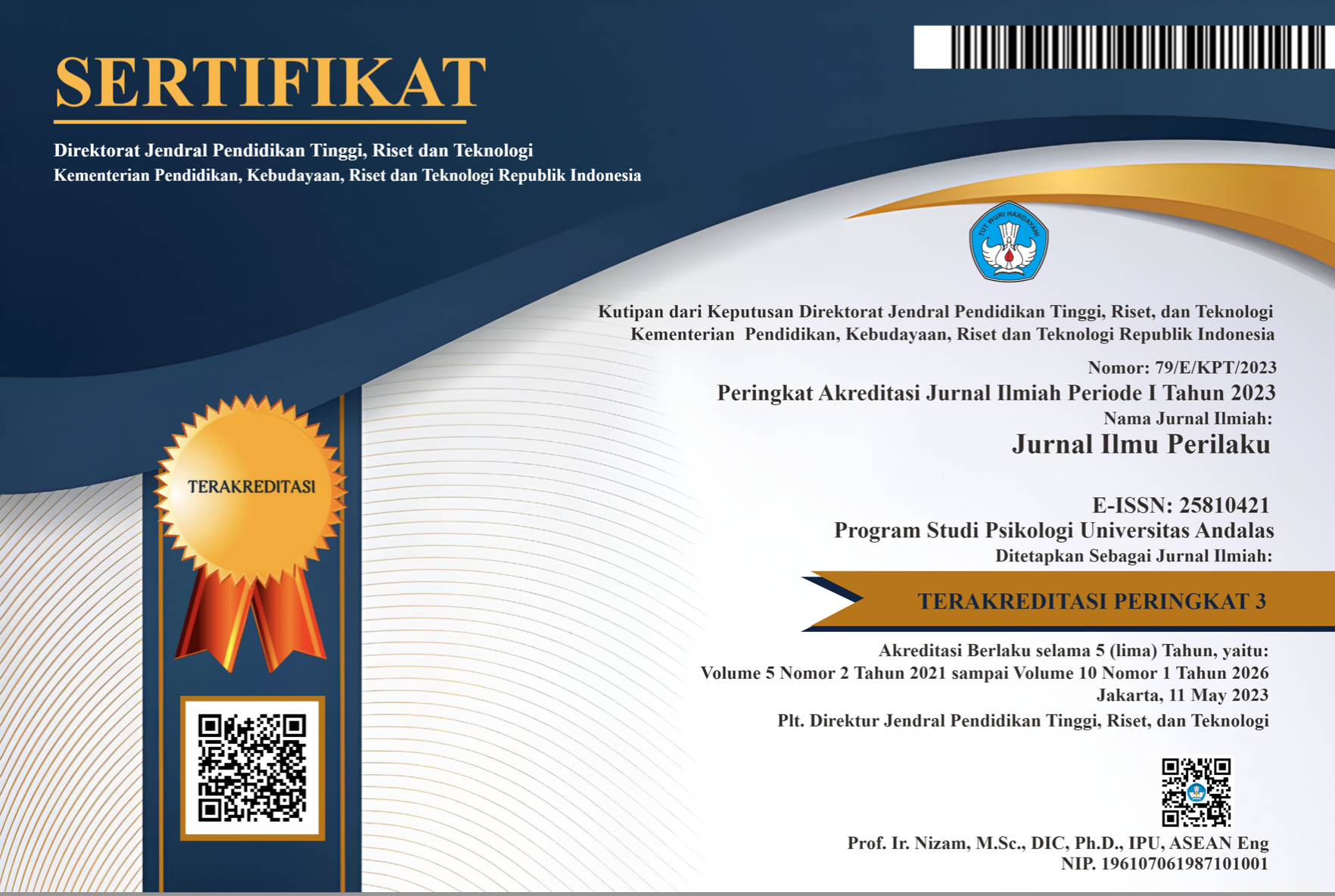Mindfulness, Self-Compassion, dan Humor Styles
Abstract
Variables of this study are mindfulness, self-compassion, and humor styles that are related to mental health, which are important and become the attention in the world. The purpose of this study was to determine the role of mindfulness and self-compassion in a single way or combine with humor styles. Sample consisted of 261 students from 447 populations and used quantitative approach. Results of the first phase using linear regression to see role of mindfulness toward humor styles stated that mindfulness did not play a role in affiliative humor, but there was a negative role between mindfulness on self-enhancing, aggressive, and self-defeating humor. The second phase using multiple linear regression to see role of mindfulness and self- compassion simultaneously with humor styles show there was a role for mindfulness and self- compassion towards affiliative and self-enhancing, in which self-compassion played a greater role. Whereas in aggressive and self-defeating, self-compassion had less role. Based on a review of the four humor styles, mindfulness and self-compassion have the most role in self-enhancing humor. Thus, researchers suggest students to improve their mindfulness and self-compassion by adding insight, training, and applying them in everyday life.
Downloads
References
Andrews, B & Wilding, J.M. (2004). The relation of depression and anxiety to life-stress and achievement in students. British Journal of Psychology, 95. 509-521.
Bas, Z. & Dilmac. (2019). Predictive relationship between values, self compassion and humor styles of adolescents. Research of Education and Psychology (REP) 3,(2).
Bishop, S.R., Lau, M., Shapiro, S., Carlson, L, Anderson, N.D., Carmody, J... Devins, G. (2004). Mindfulness: A proposed operational definition. Clinical Psychology: Science and Practice, 11. 230-241. doi:10.1093/clipsy/bph077.
Bluth, K. & Blanton, P.W. (2014). Mindfulness and self compassion: exploring pathways to adolescent emotional well-being. J Child Fam Stud 23, 1298-1309. doi:10.1007/s10826-013-9830-2
Farell, A.K., Simpson, J.A., Carlson, E.A., Englund, M.E. &Sung, S. (2017). The impact of stress at different life stages and physical health and the buffering effects of maternal sensitivity. Healt Psychol, 36. 35-44. doi: 10.1037/hea0000.424
Gabriella, M. (2014). Studi deskriptif mengenai self-compassion pendeta di Gereja ‘X’ Bandung. (Skripsi, Fakultas Psikologi Universitas Kristen Maranatha, Bandung, Indonesia)
Herzog,T.R & Strevey, S.J. (2008). Contact with nature, sense of humor and psychological well-being. Environment and Behavior. doi 10.1177/0013916507308524.
Hubbard, K., Reohr, P., Tolcher, L. & Downs, A. (2018). Stress, mental health symptoms, and help seeking in college students. Psi Chi Journal of Psychological Research, 23. 293-305.
Jauregui, P. (2017). Extraversion, emphaty and humor styles: an investigation of the introverted sense of humor. (Senior Thesis Claremont McKenna College, California, USA).
Kementrian Kesehatan Republik Indonesia. (2018). Laporan Nasional RISKESDAS. Jakarta, Indonesia: Badan Penelitian dan Pengembangan Kesehatan.
Khramtsova, I.I & Chuykova, T.S. (2016). Mindfulness and self compassion as predictor of humor style. Social Psychology and Society. doi:10.17759/sps.2016070207.
Lie, F.F., Yan, K. & Cakrangadinata. (2018). Studi deskriptif mengenai mindfulness pada mahasiswa psikologi di Universitas ‘X’ Bandung. Simposium Nasional “Penelitian dan Aplikasi Psikologi Positif sebagai Solusi bagi Permasalahan Manusia untuk Meningkatkan Kualitas Hidup Manusia” Universitas Kristen Maranatha, Bandung.
Mangundjaya, W. L.H (2013). Is There Cultural Change In The National Cultures Of Indonesia? In Y. Kashima, E.S Kashima & R. Beatson (Eds). Steering the cultural dynamics : Selected papers from the 2010 Congress of The International Association for Cross-Cultural Psychology. https:// scholarworks.gvsu.edu/iaccp_papers/105/
Martin, R,A. (2007). Psychology of Humor, An Integrative Approach. New York: Academic Press.
Mutalik, N.R., Moni, S., Choudari, S.B., & Bhogale, G.S. (2016). Depression, Anxiety, Stress among College Students in Bagalkot: A College Based Study. The International Journal of Indian Psychology, vol 3
Neff, K. D. (2003). Development and validation of a scale to measure self-compassion. Self and Identity, 2, 223-250.
Neff, K. D., & Dahm, K. A. (2015). Self-compassion: What it is, what it does, and how it relates to mindfulness. In B. Ostafin B. Meier &. M. Robinson. Handbook of Mindfulness and Self Regulation. New York : Springer.
Nyklicek, I. & Irrmischer, M. (2017). For whom does mindfulness-based stress reduction work? Moderating effects of personality. Mindfulness, 8. 1106-1116. doi: 10.1007/s12671-017-0687-0
Ozyesil, Z., Deniz M.E & Kesici S. (2013). Mindfulness and five factor personality traits as predictors of humor. Studia Psychologica.
Papousek, I. (2018). Humor and well-being: a little less is quite enough. International Journal of Humor Research 31 (2), 311-327.
Radomska, A. (2011). Humor from the perspective of positive psychology. Implication for research on development in adulthood. Polish Psychology Bulletin. doi:102478/v10059-011-00284.
Raab, K. (2014). Mindfulness, self compassion and empathy among health care profesionals: a review of the literature. Journal of Health Care Chaplaincy 20, 95-108. doi:10.1080/08854726.2014.913876.
Reece, B. (2014). Putting the ha! In aha!: Humor as a tool for effective communication. Master of Applied Psychology (MAAP), Capstone Project, 58.
Savage, B.M., Lujan, H.L., Thiphartti, R.R & DiCarlo, S.E. (2017). Humor, laugher, learning and health! A brief review. Adv Physiol Educ 41, 341-347. doi:10.1152/advan.00030.2017
Sulistiowati & Widodo. (2015). Stres dan kecenderungan pembelian impulsif pada mahasiswa Universitas Diponegoro. Jurnal Empati, volume 4 (4), 32-37.
Tang, Y.Y., Tang, R., & Gross, J.J (2019). Promoting psychological well-being through an evidence- based mindfulness training program. Frontiers in Human Neuroscience. doi: 10.3389/fnhum.2019.00237.
Wu, D., Yu,L., Yang, T., Cottrell,R., Peng, S...Jiang, S. (2020). The impact of uncertainty stress on mental disorders of Chinese college students: Evidence from a nation wide study. Frontiers in Psychology 11, 243. doi:20.3389/fpsyg.2020.00243
Yue,X., Anna, M.L.H & Hiranandani, M.A. (2017). How humor styles affect self compassion and life satisfaction : a study in Hong Kong. Acta Psychopatologica 3, 4:41.
Yusainy, C. (2013). Overcoming aggresion : musing on mindfulness and self control. (Doctoral thesis, University of Nottingham, England, United Kingdom).

This work is licensed under a Creative Commons Attribution-NonCommercial-ShareAlike 4.0 International License.
The non-commercial use of the article is governed by the Creative Commons Attribution license as currently displayed on Creative Commons Attribution-NonCommercial-ShareAlike 4.0 International License.
JIP's spirit is to disseminate articles published are as free as possible. Under the Creative Commons license, JIP permits users to copy, distribute, display, and perform the work for non-commercial purposes only. Users will also need to attribute authors and JIP on distributing works in the journal.
Please find the rights and licenses in Jurnal Ilmu Perilaku (JIP).
- License
The non-commercial use of the article will be governed by the Creative Commons Attribution license as currently displayed on Creative Commons Attribution-NonCommercial-ShareAlike 4.0 International License.
- Author’s Warranties
The author warrants that the article is original, written by stated author(s), has not been published before, contains no unlawful statements, does not infringe the rights of others, is subject to copyright that is vested exclusively in the author and free of any third party rights, and that any necessary written permissions to quote from other sources have been obtained by the author(s).
- User Rights
JIP's spirit is to disseminate articles published are as free as possible. Under the Creative Commons license, JIP permits users to copy, distribute, display, and perform the work for non-commercial purposes only. Users will also need to attribute authors and JIP on distributing works in the journal.
- Rights of Authors
Authors retain the following rights:
- Copyright, and other proprietary rights relating to the article, such as patent rights,
- The right to use the substance of the article in future own works, including lectures and books,
- The right to reproduce the article for own purposes, provided the copies are not offered for sale,
- The right to self-archive the article.
- Co-Authorship
If the article was jointly prepared by other authors, the signatory of this form warrants that he/she has been authorized by all co-authors to sign this agreement on their behalf, and agrees to inform his/her co-authors of the terms of this agreement.
- Termination
This agreement can be terminated by the author or JIP upon two months’ notice where the other party has materially breached this agreement and failed to remedy such breach within a month of being given the terminating party’s notice requesting such breach to be remedied. No breach or violation of this agreement will cause this agreement or any license granted in it to terminate automatically or affect the definition of JIP.
- Royalties
This agreement entitles the author to no royalties or other fees. To such extent as legally permissible, the author waives his or her right to collect royalties relative to the article in respect of any use of the article by JIP or its sublicensee.
- Miscellaneous
JIP will publish the article (or have it published) in the journal if the article’s editorial process is successfully completed and JIP or its sublicensee has become obligated to have the article published. JIP may conform the article to a style of punctuation, spelling, capitalization, referencing and usage that it deems appropriate. The author acknowledges that the article may be published so that it will be publicly accessible and such access will be free of charge for the readers.










